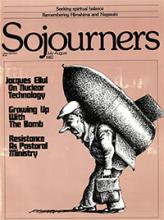One morning a few weeks ago I opened the Washington Post to one of the most extraordinary newspaper headlines I have ever read: "Billy Graham: 'I Am Not a Communist.' "
Who would have thought that Billy Graham, America's foremost evangelist, would ever feel forced to make such a disclaimer? I smiled to myself about the ironies of history and about how absurd the controversy surrounding Graham's recent visit to Moscow had become.
Billy Graham had been invited to Moscow with 1,000 other world religious leaders to attend a peace conference sponsored by the Russian Orthodox Church and approved by the Soviet government. The U.S. government did not want Graham to go.
In the weeks preceding his trip, the White House put great pressure on the evangelist. Billy Graham's presence in Moscow would add both visibility and credibility to the Russian peace conference, and the Reagan administration did not want to see that happen. And too, firsthand observation generally tends to undermine official versions of truth.
Vice President George Bush called Graham personally to try to dissuade him from going. So did Alexander Haig. But Graham held firm because, said the evangelist, "Jesus said,'Go ye into all the world and preach the gospel.' He didn't say, 'Go, into the capitalist countries only.'"
I was personally very pleased with Graham's decision. As governments vie for power with the fate of the earth , hanging in the balance, it is more and more crucial that Christians in particular become willing to bypass regular political channels to build new bridges of understanding and dialogue with the other side.
I knew that if Graham preached to the Russian people his heart would go out to them. He is that kind of man. The evangelist would come home, I hoped, more determined than ever to avert the nuclear destruction of the Russian people.
Read the Full Article

